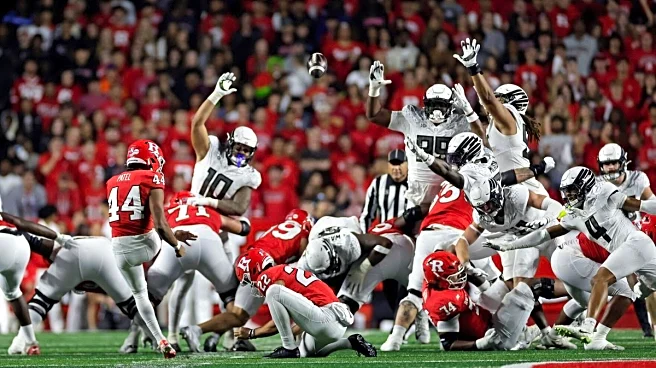When you think of Rutgers football’s 2025 season so far, you will probably think of the offense, the punt block touchdowns at the beginning of the year, and the defense’s ineptitude, which seems to be getting
worse by the week. You might only think about the four straight defeats in Big Ten play, culminating in Saturday’s 56-10 loss to Oregon. But if you look a little deeper, one of the most meaningful stories isn’t told through touchdowns or tackles — it’s told through kicks. More specifically, through kicker Jai Patel.
The senior kicker from South Brunswick isn’t just the guy who puts points on the board for the Scarlet Knights. He’s proof that Rutgers’ on-field success won’t always come from headlines, but from a culture grounded in a relentless work ethic, academic and character standards, resilience through adversity, and pride in its diversity.
A Hometown Success Story with Cultural Significance
Patel’s journey started in Monmouth Junction, not far from where many Rutgers students grew up in the Central New Jersey area. His success as a local athlete reflects the university’s push to keep homegrown talent home.
Jai was originally a soccer player, but caught the eye of South Brunswick’s longtime recreation director, Jake Rodriguez, who invited him to kick footballs at an open practice. Patel made a field goal from 25 yards out, kicking the ball into Rodriguez’s truck bed, and fell in love with the sport, going on to kick for South Brunswick High School for four seasons. He was offered by the Rutgers coaching staff as a preferred walk-on and earned a scholarship before taking over the starting job in 2023, ahead of current Giants kicker Jude McAtamney.
He ended up having the most accurate season for a Rutgers kicker in program history, going 15-18 with a long of 51 yards. Even after multiple blocked field goals this season, Patel is tied for first in Rutgers’ storied history in field goal percentage at 77.6 % and ranks fifth in made field goals with 38 and counting. He also set the school record for consecutive field goals against the Ohio Bobcats with 14 straight makes, which he then stretched to 18.
As a South Asian student-athlete thriving in the Big Ten, Patel is part of a growing movement of representation in college sports — particularly at a position where diversity has been rare. His presence on the field reminds fans that football, like Rutgers itself, is at its best when it reflects the world around it: vibrant, inclusive, and grounded in hard work.
In addition to him, UCLA’s kicker, Mateen Bhagnani, is Pakistani-American, and Sankeerth Veluri, who is a freshman offensive lineman at Purdue, is believed to be the only other Indian-American football player in the Big Ten Conference, which consists of about 1,900 total players.
Bouncing Back From Adversity On And Off The Field
This season has been far from perfect for Patel. He’s had his share of misses, starting with a couple of extra points being blocked against Norfolk State. Against Iowa, a delay of game penalty on a Rutgers offensive lineman pushed an attempt back five yards, with Patel missing from 37 yards out. He then had a chip-shot attempt blocked by Iowa’s Ethan Hurkett, before that trend repeated itself in the first drive of the Minnesota game.
Greg Schiano remained confident in Patel, saying that the kicker had worked on his motion throughout the game against the Gophers and that no changes would be made, although Dane Pizarro was thrust into action as the team’s “long-range” kicker for a 56-yard miss that would have sent the game into overtime had it been made. As I previously mentioned, that loss was not on Pizarro by any means, as the offense should have set Patel up from within his range.
Against Washington, Patel got his kicks higher off the ground, going 2-3 with the one miss being a 45-yard attempt that sailed wide right from the right hash. Although the decision to kick from that spot and distance into the wind was questionable, it was a kick that Patel should have been able to make. Nonetheless, Patel seemed to make the improvements necessary to alleviate any concerns about his low arc, which was resulting in his kicks getting blocked for the past few weeks.
It all led up to the Oregon game, with a forced and recovered fumble by the Rutgers defense allowing the Scarlet Knights to set up shop in Ducks territory early in the game. Despite the offense not being able to gain a yard on the series, Patel calmly gave Rutgers the early 3-0 lead from 51 yards out. While the kick was overshadowed by how poorly the rest of the game went, it was a showcase of Patel’s resiliency, going from multiple missed and blocked kicks to tying his career-long against one of the best opponents on Rutgers’ schedule.
Patel is no stranger to overcoming adversity. As a high school senior, he suffered a collapsed lung, which caused him to be hospitalized for a week. He had to wait two months in recovery before gradually relearning how to walk and jog, as he practiced by walking from one mailbox to the next in his neighborhood. Patel described the experience as “very humbling” and said that he now knows to “never take anything for granted.”
In a program that’s been rebuilding for years, Patel’s ability to respond to failure with quiet strength is exactly the type of mentality that turns close losses into future wins. With the defense making some changes this week, they should take a page from Patel and the special teams’ playbook; the entire unit has straightened things out after allowing multiple long kickoff returns that had put the Knights in precarious positions on several occasions.
Patel Defines The Ideal Rutgers Student-Athlete
Off the field, Patel was nominated for the 2025 Allstate AFCA Good Works Team — one of the most respected honors for community involvement in college football. Between his coursework at Rutgers Business School and his community service efforts, he’s proving that success in sports and in life can and should go hand in hand.
That matters for a school like Rutgers, which prides itself on the student-athlete model. Patel’s balance of academics, athletics, and altruism is a reminder that Rutgers isn’t just developing football players — it’s developing leaders who represent the university’s values.
Greg Schiano takes immense pride in the role he plays in developing his team on and off the field, as he speaks about building strong leaders and men at almost every press conference. Jai Patel is a shining example of Schiano’s storied CHOP culture and what it truly means to be a Scarlet Knight football player.
On top of all of that, Patel represents and takes pride in his background. In an interview with NJ.com, Patel said, “I’m proud to be Indian and represent my community, especially culturally. And I hope to inspire more people to maybe one day follow this same path.”
In a school with a student body that is 28.7% Asian, with a large portion of that being Indian and Indian American students, it is inspiring to see Patel represent the diversity of Rutgers on its football team. His stellar play only makes him that much more resonant to a community that takes pride in achieving high standards, whether that be in the classroom or across a wide variety of industries.
As an Indian-American sports journalist, I take immense pride in seeing Patel not only take the field but also kick historically well for the Scarlet Knights on Saturdays. I know that many Rutgers students, including those who do not follow sports deeply and/or do not share our South Asian heritage, feel the same way. Asian Americans have often been discouraged from both outside and inside their own community to pursue a career in sports, whether that be from the sidelines or on the field itself.
In the NJ.com article, Tyler Patel, Jai’s older sister, recalled taking him to a New Brunswick bar to celebrate his 21st birthday, where he was recognized by many faces in the crowded pub. To be known in a school of 45,000+ students is nothing short of impressive. His #44 jersey is among the top-five most viewed on the team’s official website, with Jai Patel being in the company of Rutgers legends Ace Bailey, Dylan Harper, Kyle Monangai, and Isiah Pacheco, all of whom are now successful professional athletes who play on the biggest of stages.
A Blueprint for the Program — and the Fanbase
Rutgers football is still chasing consistency. Some Saturdays, the team appears to be making progress in the Big Ten or taking down a strong nonconference opponent, some Saturdays it falls short in hard-fought battles, and some Saturdays (like last Saturday) it feels completely overmatched. But the path forward might just look a lot like Jai Patel’s career: steady improvement, quiet resilience, and belief in the bigger picture.
He doesn’t seek the spotlight. He doesn’t talk much about pressure. He just delivers — or learns and returns stronger when he doesn’t. That’s the kind of mentality Rutgers fans, students, and alumni can take pride in.
Patel’s story isn’t just about football. It’s about culture, resilience, character, and the ability to represent something larger than yourself — something every Scarlet Knight, on and off the field, can learn from.









